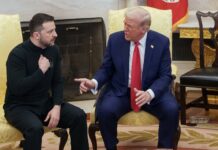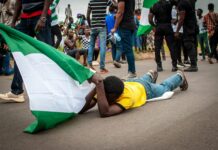The playbook often used the European colonial governments to maintain a strong grip on their power over their colonies typically involved grouping communities of differing ethnic backgrounds together in one country and pinning them against each other. Therefore rather than the different ethnic communities uniting together to oust the colonial government, they would be divided and too focused on battling against each other.
However, as evidenced by the independence of most of Europe’s former colonies, that strategy hadn’t been successful forever. Although what did follow, after the end of the colonial era in Africa, was the preservation of the colonial era borders put in place by the European colonisers, by the governments of the newly independent African states.
Rather than there being newly formed nations springing up around the African continent, based on the ethnic or religious characteristics, the newly independent African governments sought to maintain the status quo colonial borders. They were even willing to fight often brutal civil wars in order to maintain these colonial era borders.
Nigeria, my country of origin, is no exception to this phenomenon. Nigeria today, is one of the most ethnically diverse countries in the world. There are reported to be around 371 tribes within Nigeria’s borders alone. In addition to that, perhaps even more more mind-boggling, is that there are reported to be over 525 native languages spoken within Nigeria.
In line with the experiences of numerous African nations, Nigeria managed to gain independence from European colonial rule, when we gained independence from Britain, on October 1st, 1960. However, following independence a major conflict would follow. Due to the nationalistic aspirations by the Republic of Biafra, which led to a battle for seccession from Nigeria, led primarily by the ethnically Igbo separatist movement, Nigeria engaged in a harrowing civil war to maintain its sovereign borders. As a result, Nigeria’s colonial era borders have remained largely unchanged.
Is too much diversity a bad thing?
Now one might argue that diversity is a great thing for any society. In Nigeria, we have the ability to experience many incredibly unique cultures and traditions unlike anywhere else. Rather than seeing this diversity as a reason for division, they would contend that it should be considered a source of cultural pride.
One could look at the United States of America as an example of an incredibly diverse country, where people of different backgrounds can live together in harmony, with a great amount of cultural exchanges between different peoples. Or similarly other Western nations, such as the Canada, the United Kingdom and Germany, etc., that also have incredibly diverse populations.
There is however, a major difference between these western nations and Nigeria. Many of these nations have strong national identities, centred around cultural norms and traditions, religion, national languages, sports, etc., which have been in place for centuries. Unlike these countries, we do not nearly have as strong a national identity.
While an American may be able to look at another part of their country and see similar cultural activities taking place and understand the language that is being spoken. That is not really the case within Nigeria. Coming from somebody from the south of Nigeria whenever I look at images of the north or hear people from the north of Nigeria speaking in Hausa, I would hardly ever experience that same amount of familiarity that an American may experience looking at another part of their country.

The North vs South Divide
The primary point of contention between Northern Nigeria and the Southern Nigeria is religion. With Islam being the predominant relgion in the North and Christianity being the dominant religion in the South. This religious divide is exasperated due to the fact that on either sides, it is often extremly conservative (some might even say regressive) forms of the religion that are practised.
As a result, rather than us having a common vision or national identity, there is an underlying mistrust between either side. Neither wish to see their religious practices being outweighed in favour of the other. Each region harbors apprehensions about the potential dominance of the other’s religious practices over its own.
This underlying tension reared its head in the recent Nigerian general elections in 2023, after it had been revealed that the candidates from both of the dominant political parties in the country were both Muslims. People from the South of Nigeria expressed their displeasure with the choice after there had already been two terms of President Muhummadu Buhari, who is Muslim from the North.
The undeclared status quo for presidential politics in Nigeria was supposed to be that following the election of a candidate from one side of the religious/ ethnic spectrum, there would then be a switch to the other side of the spectrum. Therefore, based on the undeclared status quo, the next president should have been a Christian from the South, however it hadn’t turned out that way.
This reasoning does, in part, explain the logic behind the immense popularity of Peter Obi’s third party candidacy, as he managed to fill in the void that had been left by the two dominant political parties. As he was a Christian Igbo from Southern Nigeria.
Conclusion
As Nigeria navigates its path forward, addressing these underlying tensions and fostering genuine dialogue and understanding between the regions is essential for building a cohesive and inclusive national identity that transcends religious divides. Only through concerted efforts to bridge these gaps can Nigeria truly realize its potential as a unified nation, otherwise perhaps it may just be better for the country to break eventually break up.











